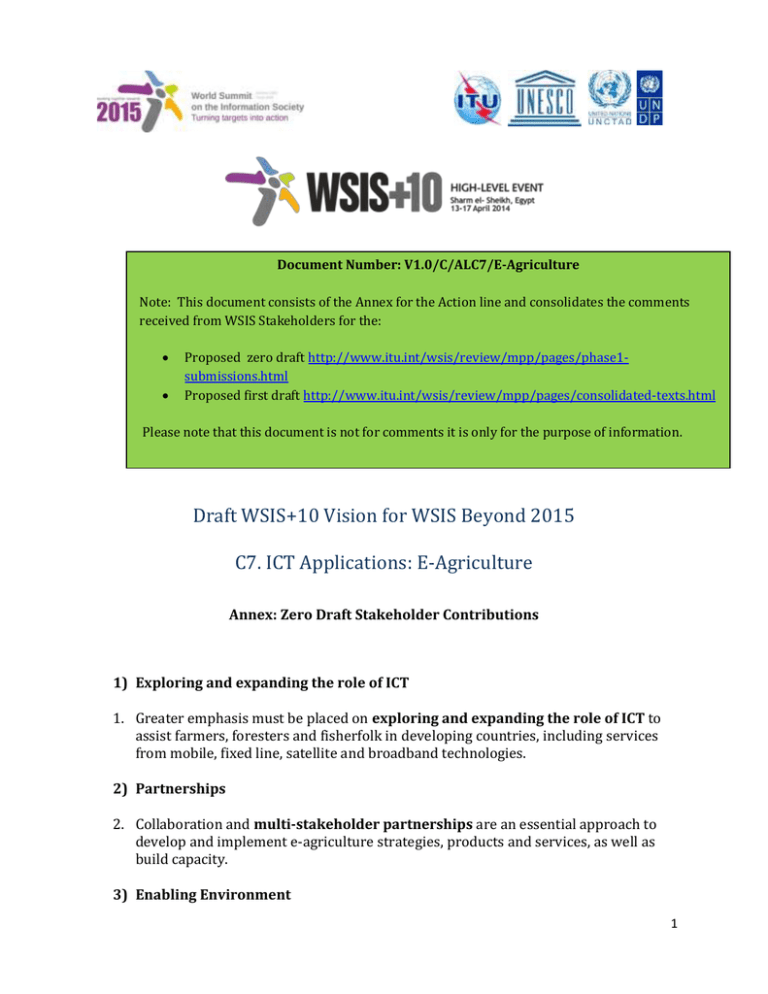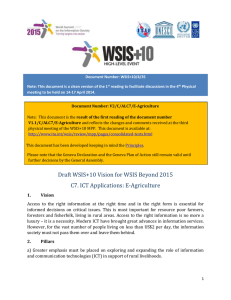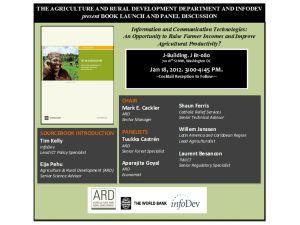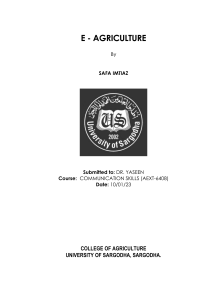Document 13472243
advertisement

Document Number: V1.0/C/ALC7/E-Agriculture Note: This document consists of the Annex for the Action line and consolidates the comments received from WSIS Stakeholders for the: Proposed zero draft http://www.itu.int/wsis/review/mpp/pages/phase1submissions.html Proposed first draft http://www.itu.int/wsis/review/mpp/pages/consolidated-texts.html Please note that this document is not for comments it is only for the purpose of information. Draft WSIS+10 Vision for WSIS Beyond 2015 C7. ICT Applications: E-Agriculture Annex: Zero Draft Stakeholder Contributions 1) Exploring and expanding the role of ICT 1. Greater emphasis must be placed on exploring and expanding the role of ICT to assist farmers, foresters and fisherfolk in developing countries, including services from mobile, fixed line, satellite and broadband technologies. 2) Partnerships 2. Collaboration and multi-stakeholder partnerships are an essential approach to develop and implement e-agriculture strategies, products and services, as well as build capacity. 3) Enabling Environment 1 3. Systematically integrate ICT policies, content and capacity development into national and regional agricultural policies. 4. Integrate agriculture into national and regional ICT policies. 5. Promote e-agriculture as an efficient mechanism to improve rural areas, in particular to boost entrepreneurship and economic growth. 6. Raise awareness and create ICT tools to enhance agriculture as a way to help development. 7. Reduce the costs associated with information access in rural areas, with the goal of ensuring direct individual access to relevant content for smallholders. 4) Capacity Development 8. Foster digital literacy and provide specialized training for girls and women, people with disabilities, children and young people to overcome illiteracy and/or to improve existing skills. 9. Ensure capacity development occurs at the individual and institutional levels. 10. Develop a capacity assessment framework with clear indicators that are relevant and acceptable. 11. Continue to develop information and experiences sharing networks in the agriculture sector, including the e-Agriculture Community. 12. Make agriculture and related economies knowledge-based economies with ICT and agri-informatics. 5) Content 13. Improve the availability of quality content, including hyper-local information. 14. Facilitate the appropriate digitization of local knowledge, including the know-how of farmers, foresters and fisherfolk. 6) Tools and Processes 15. Promote mobile technology and mobile information services as an important tool in agricultural development and business. 16. Develop traceability systems that connect farms to consumers’ tables, providing quality data and securing reliability of our foods. 17. Improve agriculture and food production and management utilizing sensors, cloud computing and other forms of ICT. 18. Facilitate the information flows and social networks that will maximize the positive impact that the ICT can have on the livelihoods of people in rural agricultural communities. 19. Expand upon the success of farmers and business peoples using mobile technology to access real-time data and to sell their crops/produce remotely. 20. Use ICT to enable a value chain that more closely collaborates with producers and make it more efficient to reduce post-harvest losses. 2 21. Support the use of new technologies – such as machine to machine (M2M) applications – to improve the efficiency of existing practices, and quickly identify and solve problems which could impede efficient management of food production. 7) Women and Youth 22. There is an urgent need for affordable and quality ICT access providing relevant, quality and actionable content in rural areas, with a particular focus on agricultural smallholders, women and youth. 23. Empower and ensure access for rural women and girls, and youth with the capacity to use ICT in agriculture. 24. Youth must be mentored and encouraged to enhance the agricultural sector through their own ICT innovations. 3





